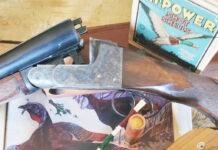How much courage did it take to travel 2,170 miles of rugged America in the mid-1800s? Nearly every grade school student who visited my home when my children were growing up still seem to have stories about their near-death experience attempting to travel The Oregon Trail from my living room.
Raising my children on a small farm in the 1990s meant a great deal of time spent exploring outdoors, playing ball, swimming and riding bikes. But, during one particularly long rainy stretch, I spent what felt like a great deal of money to buy the one educational video game worth having at that time, and suddenly we were the cool family to visit.
The game played from our first computer, a Mac, which seemed to have exceptional graphics for those early days of video play. Don Rawitsch, a young history major who created the game with his roommates at Carleton College in Minnesota while student teaching, realized he had a hit with The Oregon Trail when kids lined up in the hall after school for a chance to play.
The class on western movement of roughly 400,000 Americans from 1840 to 1860 suddenly got a whole lot more interesting. This game placed children in that historical moment and helped them see the necessity of planning ahead while suffering through a variety of consequences, sometimes because of bad choices, but some bad breaks were completely out of their control.
Choosing your profession as the Oregon Trail traveler played a role in success. A banker, a teacher, a farmer, a carpenter — each choice could influence breaks within the game.
A farmer rarely ever lost his oxen to injury or death, and this was a big plus. A carpenter might have strengths in building better ways to cross a river, and a teacher got bonus points right off the top.
I will forever remember the music, and the sad tombstone scenes when a member of the traveling party encountered anything from snake bite to typhoid.
“Mom, Mom, guess what? I perished! What does that mean I get to do now?” I remember my innocent daughter so happily asking.
A little vocabulary lesson was wrapped into the American history lesson, and suddenly she wasn’t so perky about that new word she just learned.
Grade school classmates asked if they could ride home from school with my children, and the computer game remained a hot ticket item for a long stretch. There were times I felt we were in Independence, Missouri, ready to embark on the trail, as I listened to a group of kids with various strategies being kicked around.
“Do we want to start in February or March this time? Do we want to buy less at the beginning so we don’t have so much weight and more money?”
The answer to both was no. Start in April for best weather conditions and good grazing for the oxen.
Money won’t do a whole lot of good in the middle of nowhere, but an extra wagon wheel can be traded for food or a healthy oxen or two. A decent supply of bullets purchased ahead of time at the General Store, and time set aside for hunting along the way, meant the difference between staying healthy or the entire party becoming sick.
Even clothing suddenly had value, and made kids realize what dealing with the elements really meant. River crossings on the way to Oregon’s Willamette Valley could be accomplished with help from a guide for a hefty $5 fee.
Was it worth the money that might be needed for supplies like bullets for hunting food for survival? Nearly every single time, the answer was yes.
“The Snake River sunk us again!” someone would yell out, and the tombstone music would begin.
Time for the next players to make big decisions, working toward Chimney Rock, Fort Walla Walla, Fort Laramie.
Discussions involved stocking up on cheap hunting supplies, planning on what to hunt and what to leave alone, resting when a member of the party was sick, injured or weak with exhaustion. The young travelers learned it was wise to fish, barter and trade every chance offered, and study the map, giving consideration to branches in the path for optimum water sources, grazing, and camping.
These were basic things I observed children learning from our living room. I made a whole lot of spaghetti and pizza for the westward pioneers, and it was the beginning of something wonderful.
To this day, many of those young visitors still think of us as bonus parents and include us in their lives. No amount of cholera, typhoid, snakebite, accidental wounds or dysentery can take that away.













